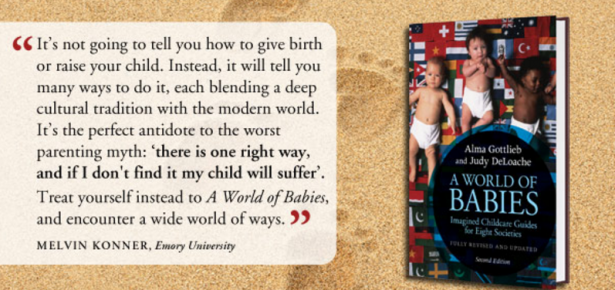
Babies everywhere are delivered, usually welcomed, and often celebrated . . . but in the Beng community of Côte d’Ivoire, they are also lured back into this life from wrugbe, the afterlife, where Beng souls are said to live after death until they are reborn.
How do you care for a baby who’s come from the spirit world of wrugbe? Understanding the baby’s needs can be challenging, as the baby is seen as mired in unspoken memories from another existence in a mystical world. In Beng communities, diviners and elders make themselves available to new parents, to assist with the transition and help identify the baby’s spiritual needs as the child gradually returns to this life over the course of anywhere from three to six years. Attending to those spiritual needs often requires a visit to the diviner, a religious specialist who is said to speak the language of the afterlife—hence, is able to communicate directly with infants and toddlers. After mystically conversing with the child, the diviner might counsel the parents to give the baby a necklace or bracelet threaded with cowry shells (reportedly, the currency of the afterlife); or dress the baby in white on Fridays (a sacred color for a sacred day); or change the baby’s name to reflect the name the baby had while living in the other world.
For those not in direct contact with a Beng diviner or elder, A World of Babies provides guidelines. Based on ethnographic research I have conducted with the Beng throughout my research career (beginning in 1979), in this chapter, I imagine a Beng grandmother and a male diviner relaying both practical and spiritual childcare advice (respectively) to expectant mothers concerning how to best care for a Beng baby. (To welcome a baby from wrugbe, one of the initial steps is the baby’s first bath, when the child is bathed with a traditional kind of black soap that is also used for bathing corpses with—in other words, urging souls to move unidirectionally between this life and the afterlife.) Along with recommendations for pre-and postnatal care, the chapter contextualises Beng society in relation to French colonial rule and current political events in Côte d’Ivoire.
A World of Babies
Beyond these spiritual considerations particular to Beng society: Is it best for babies to sleep with the parents, or in a crib or cot? Is talking to babies useless, or good for development? Actually, the new edition of A World of Babies challenges the widespread assumption that there is one ‘right’ answer to these and other child-rearing questions that occupy new parents the world over.
The book takes the form of imagined child-rearing manuals written in the style of popular parenting guides by such experts as Dr. Benjamin Spock and Penelope Leach. With this creative format, the book includes practical advice from eight societies around the globe.
Each chapter has two parts: an ethnographic overview of the society at large, and a unique, immersive childcare guide. This ethnographically imagined manual is fictively aimed at new mothers in the society profiled, advising about customs, challenges, and expectations that come with raising a baby in that social world. While the book’s robust scholarly foundation makes it useful for scholars (the author of each chapter has conducted extensive, long-term fieldwork on family issues in the society profiled), its user-friendly writing style makes the book an absorbing read for students at all levels. It’s also proven a popular gift to expectant mothers (including on the US ‘baby shower’ circuit).
The second edition is fully revised and updated for the 21st century, including the impact that hyper-connectivity via technology has had on childcare. For instance, the book addresses the role of mobile phones as a community-building tool for both Muslim immigrant mothers from Guinea-Bissau now living in Portugal, and for Somali-American mothers in the United States.
Of course, technological advances aren’t the only changes affecting childrearing around the world. Rapid globalisation, political upheaval, and societal shifts all challenge parenting advice between generations. Readers will discover conflicting advice in the book . . . in some cases, all within one chapter.
The book also includes a fully updated Introduction, including a discussion of the theoretical challenges and payoffs of writing about child-rearing issues in the creative voices of local parenting authorities.
Childrearing in War Zones
This edition of A World of Babies includes several societies in (or recently in) war zones. Two chapters cover childrearing in Palestine and Israel. These chapters illustrate the complex, often harrowing decisions that parents—and educators—must make while navigating near-constant threats of violence.
For those living in more stable societies, imagining raising a child in a conflict zone is unfathomable. Yet, ongoing violence and displacement are threats for far too many families globally. Parents and children living in conflict zones, and those who have managed to gain asylum in Europe or the US, face challenges daily. Glimpsing their challenges underscores the need to advocate for the rights of those affected by violence, while understanding the complex background of the challenges facing parents and others responsible for raising children in regions wracked by unrest.
Find out more about A World of Babies on the book’s Facebook Page
Latest Comments
Have your say!